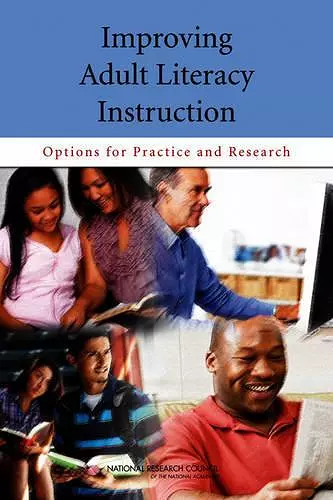Improving Adult Literacy Instruction
Options for Practice and Research
National Research Council author Division of Behavioral and Social Sciences and Education author Committee on Learning Sciences: Foundations and Applications to Adolescent and Adult Literacy author Alan M Lesgold editor Melissa Welch-Ross editor
Format:Paperback
Publisher:National Academies Press
Published:26th Apr '12
Currently unavailable, and unfortunately no date known when it will be back

A high level of literacy in both print and digital media is required for negotiating most aspects of 21st-century life, including supporting a family, education, health, civic participation, and competitiveness in the global economy. Yet, more than 90 million U.S. adults lack adequate literacy. Furthermore, only 38 percent of U.S. 12th graders are at or above proficient in reading.
Improving Adult Literacy Instruction synthesizes the research on literacy and learning to improve literacy instruction in the United States and to recommend a more systemic approach to research, practice, and policy. The book focuses on individuals ages 16 and older who are not in K-12 education. It identifies factors that affect literacy development in adolescence and adulthood in general, and examines their implications for strengthening literacy instruction for this population. It also discusses technologies for learning that can assist with multiple aspects of teaching, assessment,and accommodations for learning.
There is inadequate knowledge about effective instructional practices and a need for better assessment and ongoing monitoring of adult students' proficiencies, weaknesses, instructional environments, and progress, which might guide instructional planning. Improving Adult Literacy Instruction recommends a program of research and innovation to validate, identify the boundaries of, and extend current knowledge to improve instruction for adults and adolescents outside school. The book is a valuable resource for curriculum developers, federal agencies such as the Department of Education, administrators, educators, and funding agencies.
Table of Contents- Front Matter
- Summary
- 1 Introduction
- 2 Foundations of Reading and Writing
- 3 Literacy Instruction for Adults
- 4 Principles of Learning for Instructional Design
- 5 Motivation, Engagement, and Persistence
- 6 Technology to Promote Adult Literacy
- 7 Learning, Reading, and Writing Disabilities
- 8 Language and Literacy Development of English Language Learners
- 9 Conclusions and Recommendations
- References and Bibliography
- Appendix A: Biographical Sketches of Committee Members and Staff
- Appendix B: Literacy in a Digital Age
- Appendix C: Interventions to Develop the Component Literacy Skills of Low-Literate Adults
- Appendix D: Search Procedures and Reviewed Studies of Adult Literacy Instruction <
ISBN: 9780309219594
Dimensions: unknown
Weight: unknown
504 pages